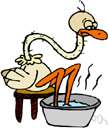A beast of a servant came up with a lantern, at last, shouting - "Keep fast, Skulker, keep fast!" He changed his note, however, when he saw Skulker's game.
"That's Miss Earnshaw?" he whispered to his mother, "and look how Skulker has bitten her - how her foot bleeds!"
Afterwards, they dried and combed her beautiful hair, and gave her a pair of enormous slippers, and wheeled her to the fire; and I left her, as merry as she could be, dividing her food between the little dog and Skulker, whose nose she pinched as he ate; and kindling a spark of spirit in the vacant blue eyes of the Lintons - a dim reflection from her own enchanting face.
It may have been a weakness, but if so, it was equally the weakness, I believe, of King Frederick of Prussia.' These remarks being offered to Mr George Sampson, who had not the courage to come out for single combat, but lurked with his chest under the table and his eyes cast down, Mrs Wilfer proceeded, in a voice of increasing sternness and impressiveness, until she should force that
skulker to give himself up.
"I am as ready to do the one as the other; but to fight the Iroquois 'tis necessary to find the
skulkers; and to eat,'tis necessary to get the game--talk of the devil and he will come; there is a pair of the biggest antlers I have seen this season, moving the bushes below the hill!
'It's good advice, whichever of you
skulkers gave it,' he went on angrily.
Only, my brethren, see that ye scare the dogs away from him, the idle
skulkers, and all the swarming vermin:--
In one word, Thoreau was a
skulker." After limbering up with these generalizing indictments, Stevenson got down to the real problem with this priggish, womanish, unmanly
skulker in the fourth section of his essay, in which everything he said about Thoreau's alleged lovelessness doubled implicitly as a defense and an affirmation of his pursuit of Fanny: "He has no illusions; he does not give way to love any more than to hatred, but preserves them both with care like valuable curiosities.
A more serious take-down of Thoreau came from Robert Louis Stevenson in a two-part essay published in Cornhill Magazine in 1880, which dwelt at length on "the limitations of his mind and character." Stevenson writes of his "acid sharpness of insight, with * his almost animal dexterity in act," but observes a lack of "unconscious geniality," and "[s]o many negative superiorities" that Thoreau begins "to smack a little of the prig." He is not an "ascetic" but an "Epicurean." "Apt to be something unmanly." "A
skulker." "[M]orbid even in the pursuit of health."
The best we can get from this coming struggle will be the closing up of the ranks of labor, the forcing out into the open of every traitor and every
skulker, and the discipline and experience to be had from organization and the winning of victories from an enemy that fights every foot of the ground and resorts to every wile and infamy that can be suggested by the devil, the father of all lies.
 skulker - someone shirking their duty by feigning illness or incapacity
skulker - someone shirking their duty by feigning illness or incapacity